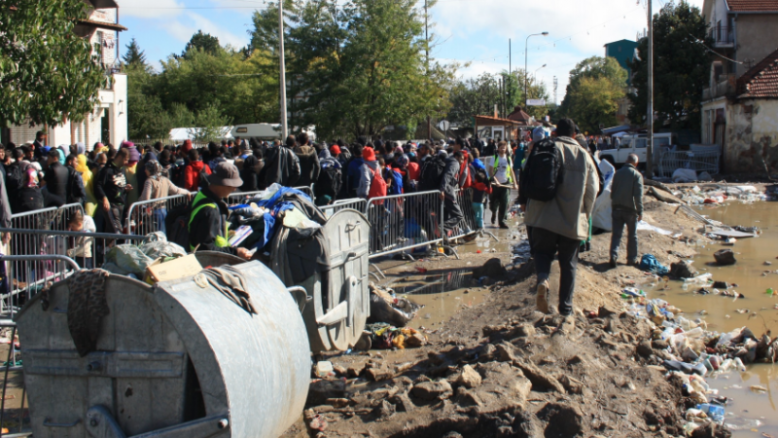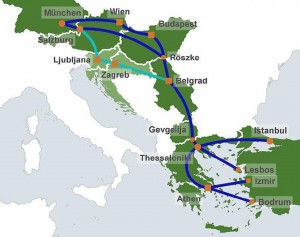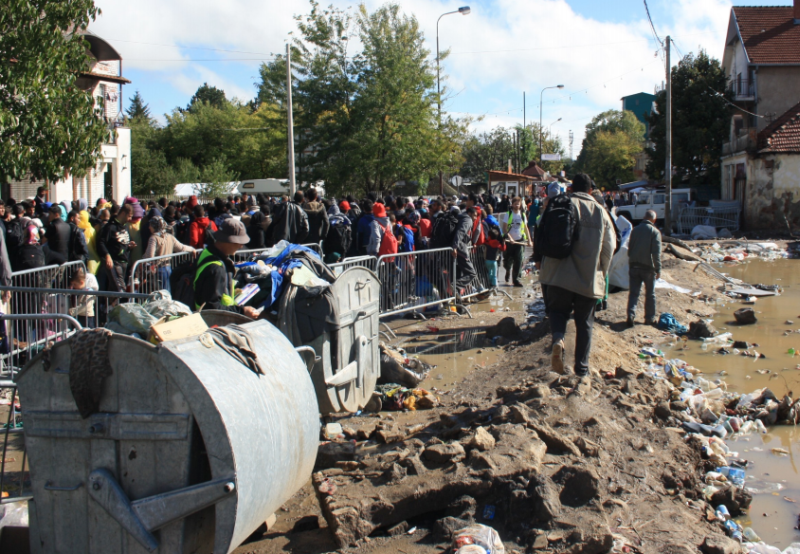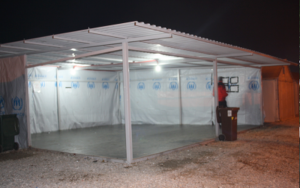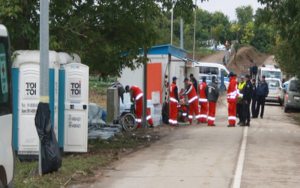Preface | Part 1 | Part 2 | Part 3 | Part 4 | Part 5 | Part 6 | Part 7
Summer of Migration – Part 3: Welcome to Serbia
PDF-Download: Summer of Migration Part 3 – Welcome to Serbia
The good news from Serbia during the Summer of Migration was the absence of bad news. In July 2015, the Serbian government already started conceiving the task of having to receive half a million migrants in camps, and considered this to be possible. However, in the background of this Merkel-conform optimism, there always lingered the anxious question of how durable this optimism would be. Aleksandar Vučić, prime minister from the Serbian Progressive Party, is a former extreme nationalist, who made a 180 degree turn to consent to all EU projects (except the Russia embargo). Serbia does depend on Western loans.
After the Yugoslav war, Serbia had a certain empathy towards migrants due to the population’s own experience. However, simultaneously, a latent anti-Muslim racism subsists, which the government can easily activate given its total control over the media. In the event of a change in EU mainstream politics and a success of the attacks on Merkel’s policies, a U-turn in Serbian politics was a constantly looming dreaded possibility. That Vučić’s government resisted this temptation might be the most important feature of the fortunate sequence of events described here.
The number of people desiring to reside in Serbia remained low. The Balkan states were themselves countries of emigration, and Belgrade was the place where the migratory movements of the West Balkan Route coalesced with the migrations of Roma and Albanians from the Balkans.[1] However, in June the number of migrants on the West Balkan Route exceeded the number of Balkan emigrants by far, and towards the end of July Frontex was spreading fear-mongering analytics: 50.000 migrants had crossed the Greek borders in July alone, the same as in the whole of 2014.[2] A report by WOZ from Belgrade characterises the situation in late August, after the re-opening of the Macedonian border:
In contrast to Macedonia, Serbia quickly reacted to the emergency situation. On Sunday already, a new reception centre for around 4.000 persons was constructed. The composed response of the Serbian population to the increasing number of refugees is remarkable. In Belgrade, around 1000 refugees inhabit a park in the middle of the city every day. They lie on blankets or cardboard, sleeping or dozing, before continuing onwards with the next train or bus towards the Hungarian border. In the beginning, resting in this unregulated place was tolerated. However, the area became increasingly littered and an unpleasant smell developed, given that no place where refugees could relieve themselves was provided. Thereupon, spontaneous citizen initiatives started taking care of the people. Volunteers distributed clothes, water and hygienic items. And eventually, politicians also got involved.“
Promises in the park
The state will help the migrants, prime minister Aleksandar Vucic announced when visiting the refugees in the park in person. He continued by saying that they were welcome in Serbia, and that he would not participate in a campaign against refugees. After all, the Serbian population had experienced similar suffering twenty years ago…
Given this recent history, it is not a coincidence that Serbia considers the rising number of refugees a humanitarian challenge, and not primarily an issue of border security; while Hungary and Bulgaria build fences, Belgrade provides mobile toilets and a car tank with fresh water. Moreover, an information centre for refugees providing legal support, computers and free WLAN was constructed recently.“[3]
The border town Presevo was the first port of call for refugees in Serbia. Here, UNHCR had erected a reception office and the army had set up tents – although never in sufficient numbers. Every day and night, hundreds were forced to stay on the open field or on the street. They queued first in the blistering heat and later in the rain and mud, in order to receive a small paper authorising them to transit through the country within 72 hours. The first groups of migrants had to struggle along the train tracks for 400km from Presevo to the North,[4] but from August onwards migrants could continue to the North in double-decker buses – with an interim stop in Belgrade or directly to the Hungarian border.
The following report by Hauke Heuer in the journal Sieh die Welt describes the situation in Presevo in early August:
Refugee columns
Together with members of the Serbian NGO „Centar E8“ I want to assess the situation. We already see the first columns on the highway. Big groups march from Presevo towards Northern Serbia. They carry minimal luggage – only their sleeping bags tied to their belts. There is no question about the route. A young man waves his hands, like a traffic warden, when we let down the window, and unequivocally points to the centre in the direction of the police station. We park the car close to the mosque. When we exit, the Muezzin calls for prayer in a droning tone. „This is just a record. We cannot afford anything more here“, says one of my companions.
The situation in the streets around the police station confirms the reports from my colleagues. Hundreds of men, women and children – mostly from the Middle East but also from North and Central Africa – rest on the pavements or directly on the street while waiting for their documents for their onward journey to Hungary.
There is garbage everywhere. Empty plastic bottles and packaging fill the roadside ditch. The masses try to find a sheltered spot under the shade of the trees. A few people are hanging on the fence of the police station, trying to negotiate with the handful of police officers securing the area. The officials do not react, they wear surgical masks as if they were in a hospital, and rubber gloves.
Nerves on edge
We pass through the gate with semi-raised hands, and try to talk to the highest ranked among the uniformed officials. He immediately points his finger in the opposite direction. We discuss, ask for concrete numbers. „Until a couple of weeks ago, around 20 or 30 people showed up per day. Today we register up to 600 people daily“, the police officer mumbled through his mask and pushes us back to the exit. „How is the situation?“, asks my Serbian companion. „We do not have enough people and are completely overwhelmed. As you can see!“, the official answers impudently and closes the gate behind us with a loud bang. Nerves are on edge.
Back on the road the overload is visible – nothing is progressing. Long queues form in front of a makeshift office opposite the police station. Numbers are written on the hands of the waiting with black ink – the entry ticket to the fenced police yard ahead. This is where the actual documents are available. In some cases, refugees have to wait for up to three days until they receive the required papers.
Meanwhile, the boiling Balkan sun is burning and the two large blue water canisters are empty. Once a day, helpers of the Serbian Red cross arrive to distribute food but only about a third of the people receive a ration. The rest is told to wait for the following day. „We have nothing! We give our food to the children and to the elderly“, says Muhammad from Damascus, who is on the way to Germany with his seven family members to escape the civil war in Syria.“[5]
That the Serbian forces did not suffice for providing for the humane needs of the rising number of migrants in July, cannot be blamed on this country, which is still weakened by the war and whose military has more experience in the organisation of massacres than in the support of refugees. When the German police started complaining about overwork, the Serbian police had – without questioning the sense of their actions – already spent many weeks stamping thousands of papers, which were carelessly thrown away only a day later.
Rather, if the circumstances in Serbia are to be criticised, then this criticism should primarily address UNHCR and NGO personnel. Activists along the route repeatedly witnessed that UNHCR offices closed before the last buses arrived, and that UNHCR storages were filled with tarpaulins and mattresses which were not distributed. Moreover, in Presevo and in Idomeni, UNHCR interpreters participated and were complicit in language-based selection. UNHCR and NGO facilities were often behind the police barricades, where migrants had already overcome the worst. This is consistent with reports from the island of Lesbos, where UNHCR participated in the registration of migrants, but did not help to pull a single person, not a single child, out of the water. That the rations of the Red Cross were on many days even more insufficient than the rations of the Welthungerhilfe (World Hunger Aid) in Lebanese camps, cannot be explained with being overwhelmed by excessive demands alone.
The following pictures taken in October by three activists from Osnabrück, Bremen and Kiel show the queues of people waiting in front of the stamping office in Presevo, and contrast the UNHCR pavilion, Red Cross employees and police officers on the quiet side of the barrier with the sleeping possibilities for migrants in the rain and mud of Presevo: [6]
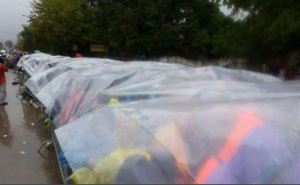
Fig 4: Migrant accommodations
The activists report about their first impressions in Presevo:
The city of Presevo is located in Southern Serbia adjacent to the Macedonian border. Every day, around 10.000 people arrive in Tabanovce in Macedonia by train and subsequently walk on a muddy and wet road for approximately two kilometres across the border until Miratovac in Serbia, in order to then take the bus to Presevo. Almost everybody arrives in Presevo with wet feet. Here, there are still attempts to rip off the arriving people with overpriced taxi journeys or SIM-cards, despite a number of unconfirmed arrests of mafia taxi drivers. By now there is a kitchen and an Infopoint, where warnings about the taxi drivers and about the procedure in the registration camp are provided in different languages. Refugees have to register, in order to be allowed to legally stay in Serbia for 72 hours and to transit in buses until Sid at the Croatian border. In addition to UNHCR and the Red Cross, the organisation SOS Remar also operates in the camp, but they cease to work during the night.
Immediately after our arrival, we began supporting the hundreds of people in the queue in front of the registration centre with tea, food and blankets, alongside other self-organised volunteers. Refugees often had to wait in the line for many hours and up to two days, crammed between bars/barriers, surveyed by semi-aggressive Serbian police, without provisions from UNHCR etc. If they left the queue, e.g. in order to go to the toilet, they had to restart again from the end of the line. In innumerable individual conversations and discussions with police officials, we tried to get elderly and ill people, people with disabilities, families with small children and babies out of the queue, in order to bring them directly to the registration camp. The police took decisions in a completely arbitrary manner. The registration procedure was unbelievably slow and would even stop at night. This was unbelievable given that people were arriving all the time and the need was often most intense during the night. The space was inconceivably overcrowded and sometimes on the brink of mass panics. The police would occasionally beat the people with batons.“[7]
The activists who tried their best to support the migrants during the rainy October nights before the arrival of more volunteers, managed to partly ameliorate the situation. Here they report on their experiences with charity organisations in Presevo:
The people were sitting and standing between the trash around the fenced entries to the camp for hours without access to information. There was almost nobody caring about the supply of food and beverages, as well as the distribution of clothes and blankets, apart from us. It was pure madness! With a self-organised kitchen crew and donations, we financed and provided for thousands of people, worked day and night, barely slept and nevertheless were not able to keep up with the many people and the amount of food necessary. Most people left the camp very hungry and cold, and we asked ourselves what all the NGOs there were doing with the people! If anybody received food it was the women and children, men always exited the camp in a state of hunger. The situation was – just as it was at the other borders and camps – unbelievably degrading and inhuman. The people were pushed from one fenced off section to the next like animals, and were only allowed to leave the barriers to urinate in rare exceptions. […]
UNHCR and the Red Cross were barely visible, and at night, when they were needed the most, there were only one or two doctors. The people waiting had no possibility to sit down, and during the cold morning hours people regularly collapsed from the low temperatures, exhaustion and desperation, due to illness, old-age or pregnancy. It was so hard to bear during the night! In the very cold nights, we supported the people with hot tea and blankets as much as possible, but we had to ask UNHCR in the camp for every single blanket. UNCHR gave them out very sparingly and were sometimes completely unavailable. They were hoarding the blankets and only dared to leave the camp during the daytime without a vest, ‚because they were afraid to be beaten up by the residents of the camp‘.“
[1] In the winter semester of 2014/15, 100.000 migrants from Kosovo alone applied for asylum in Germany. In the period from January until March, 42.000 migrants from the Balkans were counted in Germany, a third of them Roma. The proportion of Roma of migrants from Serbia itself was 90%. http://ffm-online.org/2015/03/10/exodus-aus-dem-kosovo-massenstreik-mit-fuessen/, http://www.zeit.de/politik/deutschland/2015-07/asylbewerber-roma-balkan-fluechtlinge-diskriminierung
[2] http://frontex.europa.eu/news/record-number-of-migrants-enter-greece-in-july-dMt39y
[3] https://www.woz.ch/1535/balkan/erinnerung-an-die-eigene-fluchtgeschichte
[4] NBC published a photo series on the situation of migrants in Serbia: http://www.nbcnews.com/storyline/europes-border-crisis/journey-freedom-migrants-seek-asylum-serbian377946
[5] http://siehdiewelt.com/wir-haben-nichts/
[6] http://openborder.noblogs.org/post/2015/11/20/prasentation/
[7] http://openborder.noblogs.org/files/2015/10/Grenzbericht-2.pdf

